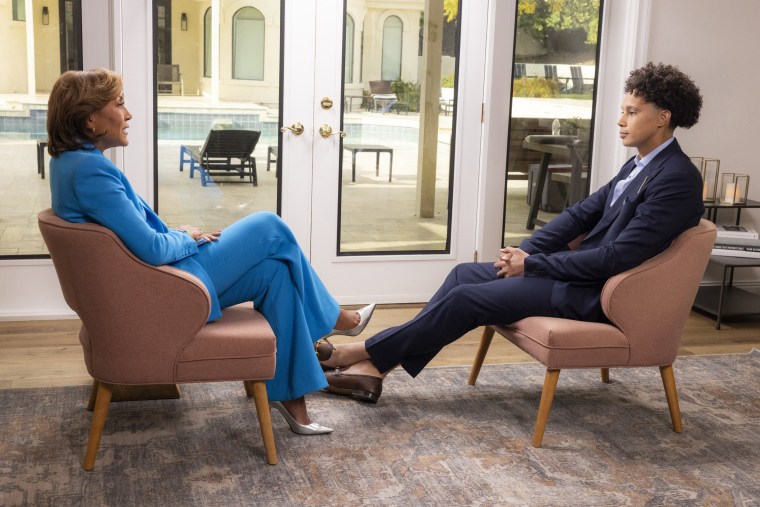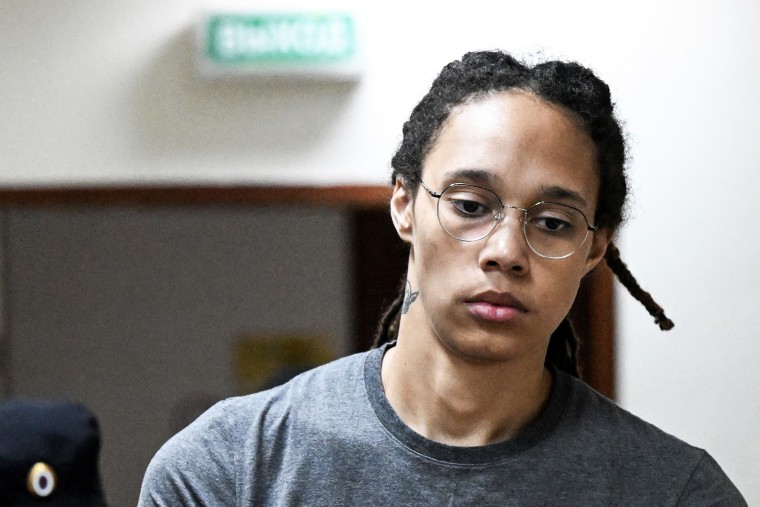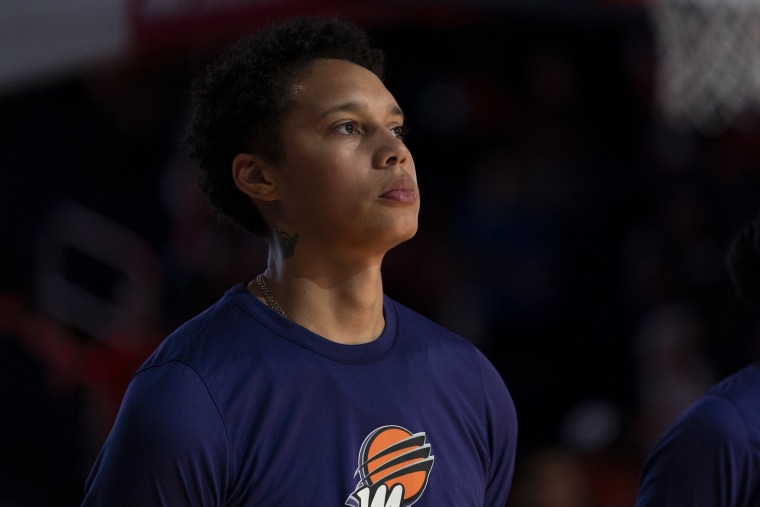Brittney Griner, the WNBA star who spent nearly 10 months in a Russian prison two years ago, said she contemplated suicide in the early days of her detainment.
“I did. I didn’t think I could get through what I needed to get through,” Griner said during a special ABC News report on 20/20 that aired Wednesday. She said considering how her loved ones would react to her death made her dismiss those thoughts and instead think, “I have to endure this.”
Griner, 33, a nine-time WNBA All-Star and two-time Olympic gold medalist, was stopped at a security checkpoint in February 2022. Two cartridges of cannabis oil, a legal substance in Arizona, where she lives and plays for the Phoenix Mercury, were found in her backpack when she landed in Russia, where possession of cannabis is a serious offense. She was issued drug-related charges and faced up to 10 years in a notorious penal colony.
During the hourlong interview with Robin Roberts, Griner occasionally became emotional as she described the fear that gripped her, details of the abhorrent conditions she faced and the frightening prospect of never returning to the United States, among other elements of her experience.
During the interview, Griner also read excerpts of her memoir, “Coming Home,” which recounts her detention in Russia and will be released Tuesday.

Griner, like many WNBA athletes, plays overseas in the off-season. She was on a Russian team for the previous seven years because of the $1 million salary she earned — about five times more than she garnered in the WNBA.
She said she did not realize the cannabis, which she uses to manage pain, was in her luggage as she hastily packed her bag after waking up late. As she was headed to a connecting flight at the Moscow airport, she was stopped at a security checkpoint, where the cannabis oil was found. Griner equated the mistake to a person losing his car keys or misplacing his eyeglasses. But she offered no excuses.
Sitting across from Roberts with curly hair instead of the trademark locs she sported that extended to the small of her back, Griner said “I knew that” cannabis was illegal in Russia. “Honest to God,” she read from her book, “I just totally forgot the pen was in my bag.”
Realizing she had the cannabis was “like an elevator just dropped from under my feet,” she told Roberts. “My life is over right here. … How was I this absent-minded to make this huge mistake? I could visualize everything I worked for just crumbling.”
After the detainment, she described frantically texting her wife, Cherelle Griner, and her agent, seeking help. Eventually, she said she was detained at a notoriously harsh jail in a 7-foot-by-7-foot cell with a bed too small for her 6-foot-9-inch frame, a sink and a hole in the floor to be used as a toilet.
Griner said she ripped apart one of the few T-shirts she was allowed in her cell to use as a washcloth to instead use as “toilet paper.”
“I felt less than human,” she said.
A week later, Russia invaded Ukraine, and “I felt like I was never coming home.”
It got worse, she said, when she was transferred to another harsh prison, Correctional Colony No. 1. She said her cell was “filth,” with “dirt and grime and a leaky sink. Blood stains.”
Breakfast there was porridge “that was more like cement” and dinner was “a little piece of fish full of bones,” she said. The mattress had a huge blood stain, Griner added. She was allowed one roll of toilet paper a month and for a few months, she said, “we didn’t get anything.” The toothpaste had expired 15 years earlier.

The toughest days, she added, came when she was left outside during the frigid Russian winter for up to two hours.
“I wanted to take my life more than once,” she said, reading from her book. “I felt like leaving here so badly.”
After 134 days, Griner went to trial. She pleaded guilty. “The guilty plea was to take ownership of what happened,” Griner said.
She was sentenced to nine years and sent to an even harsher penal colony.
“I was just so scared because of so much unknown,” Griner said. She said the new place was frigid. She shared an open space with up to 60 women. There was one bathroom with three toilets, no hot water — and a long sink that everyone shared at the same time.
Her locs froze. Spiders were so rampant that they built a nest in her hair. So she cut it.
“I had to do what I had to do to survive,” she said.
All the while, her wife, WNBA family and fans kept her name and case on the front burner through various acts, including a social media campaign, moments of silence at games and calls to President Joe Biden. Griner was aware of the push and it was encouraging, but she said hearing so many complimentary things about herself made her feel like she “was watching my funeral.”
Finally, hope emerged that she could be released. The Biden administration wanted to have her and former U.S. Marine Paul Whelan, who had been detained in Russia since 2018, released in a trade for Russians imprisoned in the U.S.
But Russia would not include Whelan, who it claims is a spy, in any deal. The U.S. has said Whelan has been wrongfully detained in Russia. On Dec. 8, 2022, after begrudgingly writing a letter of contrition to Russian President Vladimir Putin, Griner was released in a rare prisoner exchange for Russian arms dealer Viktor Bout, also known as the “Merchant of Death,” ending her traumatic ordeal.
She said that if she had the power to make the exchange, she would have included “Paul and brought him home. … No one should be left behind.”
While the harrowing experience is behind her, she said she still deals with racist and homophobic jeers, either in person or via social media.
“It’s been going on for a while,” Griner said. “I try to forget. That used to work until I realized suppressing things is not the way to go. But I know who I am, and the village I have, the people around me, know who I am. And that’s enough for me.”
She teared up when talking about the lingering impact of the arrest and prison stint. “I don’t think I’ve really gotten through it all the way,” Griner said. “I let everybody down. I try to give myself grace. People say I should give myself some grace. It’s just so hard for me to do that.”
If you or someone you know is in crisis, call or text 988 to reach the Suicide and Crisis Lifeline or chat live at 988lifeline.org. You can also visit SpeakingOfSuicide.com/resources for additional support.
For more from NBC BLK, sign up for our weekly newsletter.

